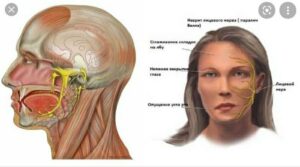SHARE WITH FRIENDS:
DETAILS OF PALACY
Paralysis (plegia) 👇
1. A pathological condition characterized by a violation of muscle innervation. Muscle strength is completely or partially lost. -
1. Pediatric cerebral palsy is a group of chronic non-progressive diseases due to brain abnormalities in the perinatal period.
2. Sleep paralysis - no muscle paralysis during sleep.
# REASONS👇
1. As a result of disorders of the central nervous system, the centers of movement passing through the central and peripheral parts are damaged. 2. Injuries (fractures and bruises)
3. Improper metabolism
4. Complications of infectious diseases (tuberculosis, meningitis, viral encephalitis, polio)
5. Strong intoxication of the body
6. Oncological diseases
7. Eating disorders
8. Hereditary predisposition
9. Congenital defects
# SIGNS👇
1. Changes in gait, lameness, lack of muscle strength in the hands, difficulty walking and standing (limb paralysis)
2. Inability to move the eyes to the side or one side, impaired coordination of movement, dizziness, eye paralysis)
3. Indistinct speech (palate paralysis)
4. Tongue tilting to the side when the tongue is removed (tongue paralysis)
# DIAGNOSTICS👇
1. General and toxicological analysis of blood
2. Electroneuromyography
3. Electroencephalography
4. Computed tomography of the head and spine
5. Magnetic resonance imaging of the head and spine 6. Magnetic resonance angiography
# TREATMENT👇
1. Angioprotectors
2. Nootropics
3. Antibiotics
4. Neurotrophic drugs
5. Surgical practice (removal of tumors and hemorrhages)
6.A, B, C group vitamins
7. Massage, exercise
# COMPLICATIONS👇
1. Diseases of the urinary tract
2. Thrombosis of the leg veins
3. Contracture, joint ankylosis
# PROPHYLAXIS👇
1. Timely treatment of infectious diseases
2. Healthy lifestyle
3. Maintain a regular diet
4. Blood pressure control
